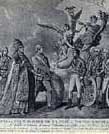Publications : 1273
-
 PublicationThe Saint-Napoleon: Celebrations of Sovereignty in Nineteenth-Century France
PublicationThe Saint-Napoleon: Celebrations of Sovereignty in Nineteenth-Century FranceThe first in English on a remarkable subject, this fascinating book is in part a collection of previously published articles, and it was born out of Hazareesingh’s earlier work on the celebration of the Fête Nationale (14 of July) during the Third Republic. Here the reader is presented with an extraordinary florilegium of details not […]
-
PublicationLouis Napoleon and Strasbourg
Perhaps the first ever book in English devotedly solely to Louis Napoleon's Strasbourg coup d'état of 1836, this posthumously published work claims to be an antidote to 160 years of Orleanist-republican, giving anglophone readers for the first time a true insight in the seriousness of Louis' first attempt at seizing power and the significant resources […]
-
PublicationAustrian Commanders of the Napoleonic Wars 1792–1815 (Elite 101)
A concise and detailed account of the careers of more than 30 Austrian commanders, illustrated with period portraits and original colour-plates. Given the almost complete lack of information in English on Austrian military figures during the Napoleonic period, this book is particularly welcome. Roll on four or five more volumes, to include statesmen and politicians! […]
-
PublicationNapoleonic Naval Armaments 1792–1815 (New Vanguard 90)
Chris HenryThis fascinating book describes the gunnery systems of the British, French, Baltic, Dutch and American navies. It includes details concerning Carronades, Congreve rockets, light guns and naval ammunition. Contents– Introduction – Design and Development – Operation History – Variants – Colour plate commentary Illustrated by Brian Delf.
-
PublicationSpanish Guerrillas in the Peninsular War 1808–14 (Elite 108)
This book is one of the first ever treatments of the formation, tactics and experiences of the Spanish guerrilla forces that fought Napoleon's army. It claims to use much previously unpublished material. Contents– Introduction – Insurrections in Spain from 1808 – Chronology – The Rise and Spread of the Guerrillas – Why become a Guerrilla? […]
-
PublicationThe Napoleonic Wars: The rise and fall of an empire (General Military 4)
This book is the publication in a single volume of Osprey Essential Histories volumes 3, 9, 17 and 39. A worthy, general, largely pro-Napoleon treatment (particularly in Fisher's chapters) of military matters of the Empire. There are however some occasionally political moments, notably, Fremont Barnes's clear treatment of the Vienna Settlement. Although it must be […]
-
 PublicationThe Amiens Truce: Britain and Bonaparte 1801-1803
PublicationThe Amiens Truce: Britain and Bonaparte 1801-1803“In 1801 Britain and Bonaparte made an armistice, which became the Treaty of Amiens in March 1802. In the brief period of peace which followed, British attitudes underwent a major change, so that when war began again in May 1803 there was little or no dissent from the view that the war had to be […]
-
PublicationThe City and the Railway in Europe (Historical Urban Studies S.)
The advent and development of railways during the 19th century not only contributed to industrialization and urbanization, but transformed relations of space and time, altering long held perceptions and experiences of distance and geography. The construction of railway networks linking stations and facilities in various cities has shaped the organization of many territories, with results […]
-
PublicationRifles: Six Years with Wellington’s Elite
From the publishers:In this work of narrative history, Mark Urban traces the story of the 95th Rifles. He follows the fortunes of six individual soldiers in the regiment, drawing upon new sources to tell a story of hardship, bravery and comradeship. As part of the Light Division created to act as the advance guard of […]
-
PublicationWellington’s Belgian Allies 1815 (Men-at-Arms 355)
The army commanded by the Duke of Wellington at Quatre-Bras and Waterloo included two infantry divisions and three cavalry brigades of the newly-unified Netherlands (or 'Dutch-Belgian') army. The part played by these troops in the two battles, under experienced officers many of whom had seen long service in Napoleon's campaigns, has often been unjustly dismissed […]

